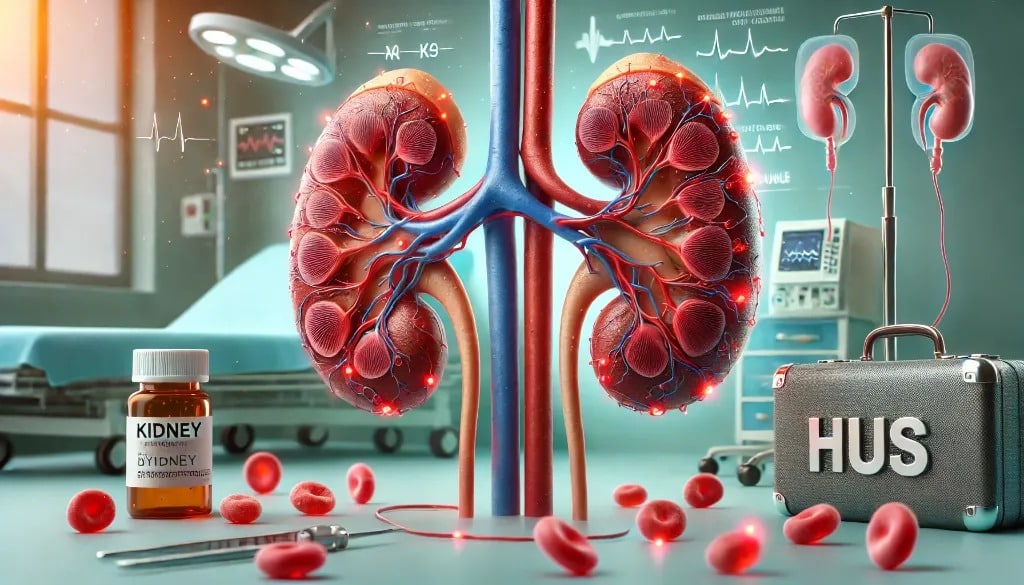Foodborne illnesses are a major health concern globally, and E. coli bacteria remain one of the most dangerous pathogens involved. While many people recover from E. coli infections after symptoms such as abdominal pain and diarrhea, certain cases can escalate dramatically, leading to complications like kidney failure. This potentially life-threatening condition, known as Hemolytic Uremic Syndrome (HUS), can leave long-term health impacts, especially for vulnerable groups like children and the elderly.
Understanding how E. coli infections can progress to kidney failure is essential for both prevention and timely intervention. Exploring the link between E. coli and kidney complications, identifying the risk factors that can increase infection severity, and learning proactive steps for protection can empower individuals to safeguard their health against this serious threat.
How E. Coli Bacteria Lead to Foodborne Illness
E. coli bacteria naturally inhabit the intestines of humans and animals, with most strains being harmless. However, certain pathogenic strains can lead to serious infections. When contaminated food or water is ingested, these harmful strains release toxins that can damage the intestinal lining. This process frequently causes symptoms such as intense cramping and diarrhea and, in severe cases, may lead to widespread systemic complications.
Contaminated meat, produce, and unpasteurized dairy products are frequent carriers of harmful E. coli strains. Proper food handling and cooking are crucial in preventing these infections, as thorough preparation kills the bacteria before it can cause illness. Education about food safety can go a long way in preventing these bacteria from turning a simple meal into a health hazard.
What Hemolytic Uremic Syndrome (HUS) Is and Why It’s Dangerous
Hemolytic Uremic Syndrome (HUS) is a rare but serious complication that can develop after an E. coli infection. When E. coli bacteria release toxins, they can destroy red blood cells, leading to anemia and clogging the tiny blood vessels in the kidneys. This interference prevents the kidneys from filtering waste properly, often resulting in acute kidney failure. The recent McDonald’s E. coli outbreak underscores how severe these infections can become, affecting many people and even leading to life-threatening complications.
HUS is particularly concerning in young children, the elderly, and individuals with compromised immune systems, as they are more susceptible to severe complications. The condition requires immediate medical intervention, as untreated kidney failure can lead to lifelong health issues or, in severe cases, death.
Symptoms of Kidney Failure from E. Coli Infection
Kidney failure from E. coli infection doesn’t occur immediately but rather develops as the toxins gradually affect the kidneys. Common symptoms of kidney-related complications from E. coli include decreased urine output, fatigue, swelling in the legs and ankles, and unexplained bruising or bleeding. These signs often indicate that the kidneys are struggling to filter waste effectively.
Prompt recognition of these symptoms is vital for treatment. When identified early, medical professionals can take action to reduce kidney damage and possibly prevent the condition from worsening. For those experiencing severe E. coli symptoms, seeking medical attention promptly can significantly improve outcomes.
Who Is Most at Risk of Developing Kidney Failure from E. Coli
While E. coli can affect anyone, some populations face higher risks of developing kidney failure after infection. Young children, for instance, have underdeveloped immune systems that may struggle to handle the toxins released by E. coli bacteria. Elderly individuals and those with pre-existing health issues are also more vulnerable to severe complications.
Understanding these risk factors helps at-risk individuals and caregivers remain vigilant when foodborne illnesses arise. Educating these populations on proper food handling and the importance of seeking prompt treatment if symptoms develop can be a life-saving measure.

Preventing E. Coli Infection and Protecting Kidney Health
Prevention is the most effective way to avoid the risk of kidney failure associated with E. coli infections. Food safety practices such as thoroughly cooking meat, washing produce, and avoiding cross-contamination in the kitchen play an essential role. Proper handwashing, particularly before eating and after handling raw foods, also helps reduce the risk of infection.
Taking extra precautions is critical for those at higher risk. For example, avoiding raw or undercooked foods and choosing pasteurized dairy products can reduce exposure to E. coli. Raising awareness of these prevention strategies can greatly reduce the incidence of severe infections and associated complications.
How to Recognize Severe E. Coli Complications Early
Early recognition of severe E. coli complications can prevent the progression to kidney failure. Symptoms like high fever, blood in the stool, prolonged diarrhea, and severe abdominal pain often signal a more serious infection that requires medical intervention. These signs should prompt individuals to seek medical help, especially in young children or older adults who are at greater risk for severe outcomes.
Seeking medical attention quickly allows healthcare providers to monitor kidney function and intervene before the infection escalates. Awareness of these warning signs and swift action can make the difference between a full recovery and lasting kidney damage.
Treatment Options for Kidney Failure Caused by E. Coli Infection
When kidney failure occurs due to an E. coli infection, immediate treatment is essential to minimize damage. In many cases, patients require hospitalization and supportive care, such as intravenous fluids and electrolytes, to stabilize kidney function. For severe cases, dialysis may be necessary to perform the filtration functions that the kidneys can no longer manage.
Medical advances continue to improve the outlook for patients with HUS and kidney failure from E. coli, but prevention remains key. Treatment can often be intensive and lengthy, emphasizing the importance of prompt and proactive medical care.

Why Public Awareness of Foodborne Illnesses Is Critical
Raising public awareness is essential in preventing serious E. coli complications and reducing the risk of kidney failure. When consumers understand the importance of food safety and the risks associated with foodborne illnesses, they can make informed choices and reduce exposure to harmful bacteria. Community health initiatives, educational campaigns, and food safety guidelines all contribute to a healthier population and fewer severe cases.
Raising awareness about the risks of E. coli and the potential consequences of kidney failure empowers people to take precautions in their daily lives. A proactive approach to food safety, combined with greater public education, can help prevent the spread of E. coli and other harmful pathogens.




